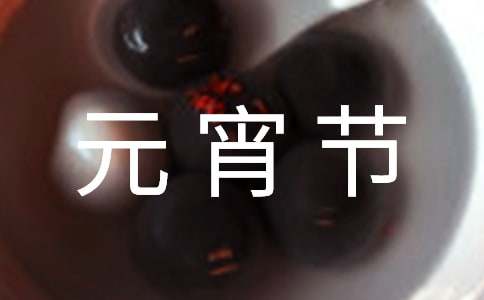元宵节来历英文
The Lantern Festival falls on the 15th day of the 1st lunarmonth, usually in February or March in the Gregorian calendar. As early as the Western Han Dynasty (206 BC-AD 25), it had become a festival with great significance.

元宵节是在阴历的元月15号,通常在阳历的二月或者三月。早在西汉时期(公元前206年-公元25年)元宵节就已经成为具有重要意义的节日。
There are many stories on how this festival was created. One other story is about a maid. In the Han Dynasty, Mr. Eastern was a favorite advisor of the emperor. One winter day, he went to the garden and heard a little girl crying and getting ready to jump into a well to commit suicide. Mr. Eastern stopped her and asked why. She said she was a maid in the emperor's palace and her name was Yuan-Xiao.
She never had the chance to meet her family after she started worked at the palace. She missed them so much every 12th lunar month. If she couldn't have the chance to show her filial piety in this life, she would rather die. Mr. Eastern promised her to find a way so she could reunion with her family. Mr. Eastern left the palace and set up a fortune-telling stall on the street and disguised himself as a fortuneteller. Because of his reputation, many people asked for their fortunes.
But every one got the same prediction - a severe fire accident on the 15th lunar day. The rumor spread quickly. Everyone was worried about the future and asked Mr. Eastern for help. Mr. Eastern said, "On the 13th lunar day, the God of Fire will send a fairy lady in red to burn down the city. If you see a lady in red wearing green pants riding a black horse on that day, you should ask for her mercy." On that day, Yuan-Xiao pretended to be the red fairy lady. When people asked for her help, she said, "I'm the messenger of the God of Fire and came to check on the city and I'm going to set up fire on 15th. This is an order from Jade Emperor. He will watch from the heavens.
I will give you a copy of the imperial decree from the God of Fire. You should go to ask your emperor to find a way out." After she left, people went to the palace to show the emperor the decree which reads "The capital city is in trouble. Fire burns on the palace, and fire from Heaven burns all night long on the 15th." The emperor of Han Dynasty was very shocked. He called and asked Mr. Eastern for advice. After pondering for a while, Mr. Eastern said, "I heard that the God of Fire likes to eat Tang-Yuan (Sweet dumpling). Does Yuan-Xiao often cook Tang-Yuan for you? On the 15th lunar day, let Yuan-Xiao make Tang-Yuan.
Your Majesty will take charge of the worshipping ceremony and you will give an order to every house to prepare Tang-Yuan to worship the God of Fire at the same time. Also, deliver another order to ask every house in the city to hang red lantern and explode fire crackers. Lastly, everyone in the palace and people outside the city should carry their lanterns on the street to watch the lantern decoration and fireworks. If everything goes this way, the Jade Emperor would be deceived.
Then everyone can avoid the fire accident." The emperor happily followed the plan. Lanterns were everywhere in the capital city on the night of the 15th lunar day. People were walking on the street. Fire crackers kept making lots of noise. It looked like the entire city was on fire. Yuan-Xiao's parents went into the palace to watch the lantern decorations, and Yuan-Xiao made a big lantern and wrote her name on the lantern. They happily reunited together after her parents called her name. Everybody was safe during the night. The emperor of Han Dynasty had a new order that people should do the same thing every year. Since Yuan-Xiao cooked the best Tan-Yuan, people called the day Yuan-Xiao Festival.
一天,东方朔出宫在长安街上摆了一个占卜摊。不少人都争着向他占卜求卦。不料,每个人所占所求,都是“正月十六火焚身”的签语。一时之间,长安里起了很大恐慌。人们纷纷求问解灾的办法。东方朔就说:“正月十五日傍晚,火神君会派一位赤衣神女下凡查访,她就是奉旨烧长安的使者,我把抄录的偈语给你们,可让当今天子想想办法。”说完,便扔下一张红帖,扬长而去。老百姓拿起红帖,赶紧送到皇宫去禀报皇上。
汉武帝接过来一看,只见上面写着:“长安在劫,火焚帝阙,十五天火,焰红宵夜”,他心中大惊,连忙请来了足智多谋的东方朔。东方朔假意的想了一想,就说:“听说火神君最爱吃汤圆,宫中的元宵不是经常给你做汤圆吗?十五晚上可让元宵做好汤圆。万岁焚香上供,传令京都家家都做汤圆,一齐敬奉火神君。再传谕臣民一起在十五晚上挂灯,满城点鞭炮、放烟火,好像满城大火,这样就可以瞒过玉帝了。此外,通知城外百姓,十五晚上进城观灯,杂在人群中消灾解难”。武帝听后,十分高兴,就传旨照东方朔的办法去做。
到了正月十五日长安城里张灯结彩,游人熙来攘往,热闹非常。宫女元宵的父母也带着妹妹进城观灯。当他们看到写有“元宵”字样的大宫灯时,惊喜的高喊:“元宵!元宵!”, 元宵听到喊声,终于和家里的亲人团聚了。
如此热闹了一夜,长安城果然平安无事。汉武帝大喜,便下令以后每到正月十五都做汤圆供火神君,正月十五照样全城挂灯放烟火。因为元宵做的汤圆最好,所以这天叫做元宵节。
This day's important activity is watching lanterns. Throughout the Han Dynasty (206 BC-AD 220), Buddhism flourished in China. One emperor heard that Buddhist monks would watch sarira, or remains from the cremation of Buddha's body, and light lanterns to worship Buddha on the 15th day of the 1st lunar month, so he ordered to light lanterns in the imperial palace and temples to show respect to Buddha on this day. Later, the Buddhist rite developed into a grandfestival among common people and its influence expanded from the Central Plains to the whole of China.
这一天重要的活动就是看灯啦。早在公元前206年至公元220年的汉代,佛教就在中国盛行。有一位帝王听说僧侣可以看到舍利,也就是佛被火化后留存在体内的东西,在阴历的正月十五这一天点灯敬拜佛祖,于是这位帝王就命令这一天在他的宫殿和庙宇里点灯以表现他对佛祖的尊敬。此后,这项佛教仪式发展成为普通民众的盛大节日,它的影响力从中原地区一直蔓延到整个中国。
Till today, the lantern festival is still held each year around the country. Lanterns of various shapes and sizes are hung in the streets, attracting countless visitors. Children will hold self-made or bought lanterns to stroll with on the streets, extremely excited.
直到今天,全国上下每年都会过元宵节。不同形状和大小的灯笼会悬挂在街上,吸引无数的游人。孩子们会拿着自制的或买来的灯笼在街上闲逛,十分开心。
"Guessing lantern riddles"is an essential part of the Festival. Lantern owners write riddleson a piece of paper and post them on the lanterns. If visitors have solutions to the riddles, they can pull the paper out and go to the lantern owners to check their answer. If they are right, they will get a little gift. The activity emerged during people's enjoyment of lanterns in the Song Dynasty (960-1279). As riddle guessing is interesting and full of wisdom, it has become popular among all social strata.
“猜灯谜”是节日的核心部分。灯笼的主人会将谜语写在一张纸条上并贴在灯笼上。如果游客能解开灯谜,他们就能将纸条拿下来去灯笼的主人那看答案是否正确。如果答案是对的,他们将会得到一份小礼物。这项活动最早在宋朝(公元960-1279)出现,当人们在赏灯的时候开始。由于猜灯谜极具趣味性,又需要动脑筋,所以后来在全社会各阶层中收到普遍欢迎。
People will eat yuanxiao, or rice dumplings, on this day, so it is also called the "Yuanxiao Festival."Yuanxiao also has another name, tangyuan. It is small dumpling balls made of glutinousrice flour with rose petals, sesame, bean paste, jujube paste, walnut meat, dried fruit, sugar and edible oil as filling. Tangyuan can be boiled, fried or steamed. It tastes sweet and delicious. What's more, tangyuan in Chinese has a similar pronunciation with "tuanyuan”, meaning reunion. So people eat them to denote union, harmony and happiness for the family.
人们在元宵节的时候会吃元宵,因此这个节日也就叫做元宵节。“元宵”还有另外一个名字—汤圆,用糯米粉做皮,玫瑰花瓣、芝麻、豆酱、枣泥、胡桃肉、干果、糖和食用油做
【元宵节来历英文】相关文章:
元宵节的来历英文07-02
关于元宵节的来历介绍英文版07-02
圣诞的来历英文07-03
元宵节 的来历07-02
中秋节的来历英文07-03
情人节来历英文07-02
元宵节灯笼的来历07-03
元宵节的来历 简短07-04
元宵节灯谜来历07-02
元宵节来历作文06-28